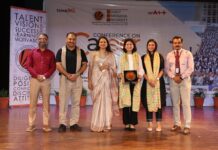LPU M.Tech (Mechanical Engineering) student Rohit Duggal, who has a specialization in Thermal Engineering, attended the International Conference on Mechanical and Aeronautical Engineering (ICMAE_2016) in HongKong. Professors, academicians, engineers and industrialists from various organizations including NITs and various foreign universities, attended this conference. organized by HongKong Society of Mechanical Engineers with the support of York University (Canada) and Beijing Jiaotong University (China).
The student, Mr. Rohit Duggal of LPU presented his unique research work on Compact Linear Fresnel Reflector (CLFR) for Solar Thermal Power Plant applications. Duggal has worked under the supervision of Dr. Ravindra Jilte working as a Professor at the School of Mechanical Engineering, LPU.
Research Abstract:
In the present study, numerical three dimensional model of trapezoidal cavity used in LFR was analysed. Results are presented in the form of Thermal losses occurring from the receiver operating with an absorber tube temperature from 350-550 K in step of 50 K and emissivity varied from 0.5-1.0. Effect of wind blowing below lower glass plate (cavity aperture) were also analysed considering the heat transfer coefficient from 5 to 25 W/m2K. At lower absorber temperature (350 K) convective losses is found to be 43% of the total heat loss whereas radiative losses accounted 57%. For higher absorber temperature radiative losses are dominant (77%) and convective losses are reduced to 23%. The air temperature gradient in the horizontal direction (parallel to lower glass plate) is found to be negligible whereas it is varied significantly in vertical direction (normal to lower glass plate). The average cavity air temperature is observed to be 480 K for low wind flow (h=5 W/m2K) and it reduces to 360 K for h=25 W/m2K. This has resulted in increased convective losses (27% higher).
















